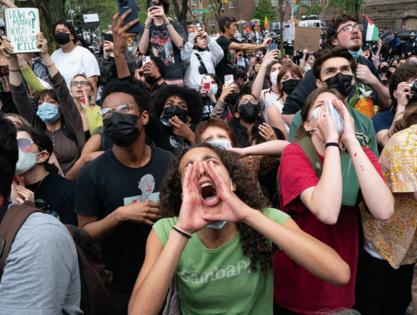Leonard Greene: 'Outside agitator' label during Columbia Gaza protests stirs memories of civil rights smears
Published in Op Eds
Whether or not you side with the student protesters making waves at Columbia University and other college campuses over the war in Gaza, we can probably all agree that irresponsible and fiery language isn’t helping anyone.
Surely, we should be able to call for a ceasefire without being labeled antisemitic.
Likewise, people should be able to protest peacefully without being tagged as “outside agitators.”
There is little doubt that pro-Palestinian protesters who led demonstrations at Columbia, City College and NYU last week were influenced by people with no ties to the schools.
But calling them “outside agitators” is using loaded and painful language, and Mayor Eric Adams has acknowledged he is well aware of that.
“We can’t have outside agitators come in and be destructive to our city,” Adams said.
In the history of American protest, no one was smeared more with the label “outside agitator” than the Rev. Martin Luther King Jr.
It is what he and his associates were called — they were called other things, too — during civil rights campaigns in Birmingham, Alabama, Albany, Georgia, Chicago, and Memphis, Tennessee, where King was shot to death while seeking dignity and justice for striking sanitation workers.
A long list of segregation defenders, including Sen. Strom Thurmond of South Carolina and Sheriff Jim Clark of Dallas County, Alabama, hung the outside agitator label around King’s neck, a strategy he addressed in 1963 in his historic “Letter from Birmingham Jail.”
“Never again can we afford to live with the narrow, provincial ‘outside agitator’ idea,” King wrote. “Anyone who lives inside the United States can never be considered an outsider anywhere within its bounds.”
Adams would be the first to admit that he stands on the shoulders of giants like King, Jesse Jackson, Ralph Abernathy and Andrew Young.
But when Adams, the city’s second Black mayor, uses the term “outside agitators” to label pro-Palestinian protest leaders at Columbia University and City College, he is opening a wound that is difficult to close.
“We know the terminology ‘outside agitator’ was used during the civil rights movement, when people attempted to show that the movement was not legitimate,” Adams said. “So we understand that.”
Still, the mayor has persisted with the rhetoric. Words matter. Adams could have easily made the same point without adding fuel to the fire.
“It is our belief they are now actively co-opting what should be a peaceful gathering,” Adams said on another occasion. “This is to serve their own agenda. They are not here to promote peace or unity or allow a peaceful displaying of one voice but they are here to create discord and divisiveness.”
President Biden took a more measured approach to the campus clashes without addressing demands that universities divest from Israel.
“There’s the right to protest, but not the right to cause chaos,” Biden said shortly before leaving the White House for a trip to North Carolina. “People have the right to get an education, the right to get a degree, the right to walk across campus safely without fear of being attacked.”
But when you pay your money, you also take your chances. Columbia has a history of protest activity, including student campaigns against the war in Vietnam and apartheid in South Africa.
It shouldn’t be a surprise that classes sometimes have to be canceled, or that graduation ceremonies hang in the balance. It goes along with the territory.
It is what every course at Columbia is — a costly lesson, but it can be a valuable one.
____
©2024 New York Daily News. Visit nydailynews.com. Distributed by Tribune Content Agency, LLC.







Comments